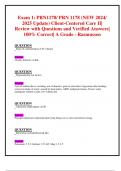Exam 1: PRN1178/ PRN 1178 (NEW 2024/
2025 Update) Client-Centered Care II|
Review with Questions and Verified Answers|
100% Correct| A Grade - Rasmussen
QUESTION
Signs of contamination of IV solution
Answer:
Cloudy, Particles visible
QUESTION
Hyponatremia risk factors
Answer:
Loss of sodium due to sweating, use of diuretics; gain of water due to hypotonic tube feedings,
excessive intake of water; caused by head injury, AIDS, malignant tumors. Excess water,
inadequate sodium in take, low sodium diet.
QUESTION
Adenosine triphosphate (ATP)
Answer:
Principal chemical compounds that living things use to store and release energy.
QUESTION
Electrolyte normal/abnormal labs
Answer:
Potassium: 3.5-5, Sodium: 135-145, Mag: 1.5-2.5
,Calcium: 9-11, Phosphate: 2.5-4.5, Chloride: 95-105
QUESTION
Clients at risk dehydration
Answer:
Elderly and children.
QUESTION
Low sodium diet
Answer:
This type of diet is good for those with heart disease or kidney disease. Protein foods, fish,
unsalted nuts, dried beans and pea.
QUESTION
Risk factors for cancer
Answer:
Family history , Life style, obesity, age.
QUESTION
Cancer Risk Factors
Answer:
Heredity, chemicals, radiation, diet, cigarette smoking, excessive alcohol use, genetics, stress.
QUESTION
intracellular fluid
, Answer:
Found in spaces surrounding cells.
QUESTION
Hypokalemia
Answer:
Low potassium.Symptoms are Fatigue, muscle aches, cardiac arrhythmias.
QUESTION
Intracelluar Fluid ICF
Answer:
Found within the cells of the body and makes up about 2/3 of the body fluid of adults.
QUESTION
Foods not high in sodium
Answer:
Grilled chicken and carrots.
QUESTION
Mechanisms is the most important regulatory of fluid intake.
Answer:
Thirst.
QUESTION
Risk factors of fluid, electrolyte, and acid base imbalances,




